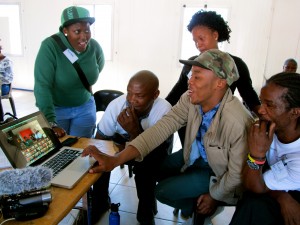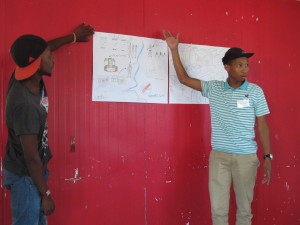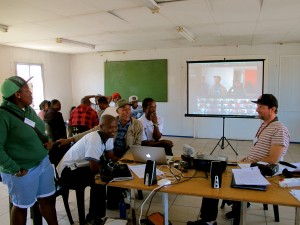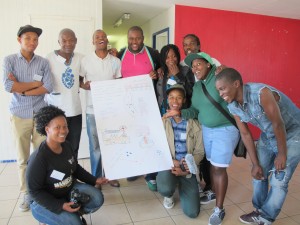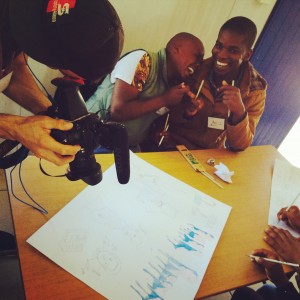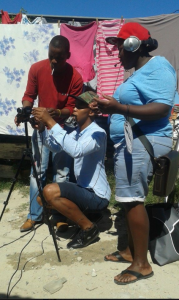Crystal Tremblay and her team have just wrapped up an exciting week-long video production training with 24 youth members of the Iliso Care Society, in Khayelitcha (Site C) Cape Town. The training was part of a Participatory Video project exploring and documenting narratives around issues of water and sanitation, among other themes. They used drawing techniques (in small groups of 2) to creatively explore and uncover important issues and stories on water and sanitation. Several themes emerged such as hygiene, dignity and safety around the use of communal taps and public toilets, pollution and impacts on water quality, and many other social concerns including teen pregnancy, drug and alcohol abuse and how music and education are a key solution. Many members of this group form a choir, organized through Iliso Care, which is not only a visible passion for many of them, but an important livelihood. Their group performs around Cape Town and was recently invited to perform in Germany.
Learning technical camera skills and communications was also a key focus of the workshop. The groups each had opportunity to learn camera handling, interviewing and developing confidence in front of the camera. We then took time to watch the footage of their practice interviews – this was a highlight and helped break the ice with a lot of laughing. The team followed this with freestyle interviewing in the community and viewing the footage, again practicing the various styles, shots and techniques – further critiquing and reflecting on the process. The groups used storyboards to develop their shots, and prepare for the field days. This was important for the groups to discuss and draw out exactly what, who and when to film – and assigned rotating roles to each person (e.g. camera holder, director, interviewer, gaining consent). Once each group presented their plan we were ready for field production! The groups captured over 25 interviews with various community members over the next four days, in addition to b-roll. These included nurses, teachers, students, business owners and family members, each sharing their concerns, challenges and frustrations on issues of water and sanitation. These experiences reveal rich narratives that feed into a larger story and legacy of systemic inequality, oppression and struggle for citizenship.
In Khayelitsha, and townships throughout South Africa, the implementation of the Water Management Device (WMD) to government issued homes (RDP) has been with much controversy. Poor infrastructure, leaky taps and a poor management has resulted in households not receiving their daily quota of water (25 L/person), and in many cases paying for water they have not received. Although this has come up in the video project, it was not a major focus. Rather, the groups decided to focus more on those individuals living in informal housing, mixed within formal dwellings. The stories they found document the sad reality, coping mechanisms and shocking conditions many of their neighbors face on a daily basis. A very serious concern is the physical and sexual assault of women at night when having to travel to toilet facilities. The documented lack of ownership of the communal taps and toilets results in serious neglect, wastage and a concern for public health and safety.
Some very positive outcomes have already resulted from this project. The evaluation interviews with each youth provided both critical and positive feedback. One of the biggest impacts has been acquiring the technical skills and confidence to do video production, but also to teach other youth in the community. When asking what he had learned through the video process, Mbo, shared that it has opened his eyes to the struggles and plight of those living in informal housing – which, he was previously unaware of. Video is an incredibly powerful medium that enables critical reflection of oneself and others place in the world.
The production team will meet for a final day of co-editing and planning before traveling back to Canada. This will entail revisiting the group storyboards and starting to build a timeline that will create the final piece. A smaller group of 4 (out of 24) have decided to take the lead in the editing and continue to involve the larger group at various times throughout the process. This was collaboratively agreed upon at the final day of the workshop.
After much interest in starting a media cooperative in this community, the research team is currently looking for funding opportunities through various sources. The idea is to start a center were this group can train other youth in the community, build skills, and be employable. Crystal Tremblay and her colleagues are planning to continue the project in April when she returns with Dr. Leila Harris, to use the final video in focus groups with local government. The intention is to explore participatory and inclusive forms of governance of water and sanitation in this community.
The video workshop was conducted by Dr. Crystal Tremblay (Postdoc at IRES) and Ilja Herb, a Victoria-based photographer/filmmaker.
